|
|
|
Sort Order |
|
|
|
Items / Page
|
|
|
|
|
|
|
| Srl | Item |
| 1 |
ID:
135007
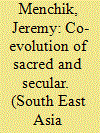

|
|
|
|
|
| Summary/Abstract |
While scholars of the Islamic revival have devoted attention to the increased prominence of Islamic law [the shari'a] in the once-secular public sphere, less attention has been paid to a countervailing trend. By mapping the evolution of Islamic law over the twentieth century, the author demonstrates that the shari'a is a product of decades of negotiations between Islamic institutions and more secular authorities including government ministers, doctors and social movements. This evolution suggests that secular authority and secular forms of knowledge have influenced but not displaced religious authority and religious forms of knowledge. The opposite is also true. This finding raises questions about the binary distinction between secular and sacred authority and suggests the co-evolution of religion and secularism in modern Muslim societies.
|
|
|
|
|
|
|
|
|
|
|
|
|
|
|
|
| 2 |
ID:
135016


|
|
|
|
|
| Summary/Abstract |
This study arises from a recent development in Malaysia – the emergence of what is commonly known as the phenomenon of 'popular Islamic novels'. The phenomenon is characterized by overwhelmingly positive public reception of novels overtly displaying Islamic external features in their titles, covers and blurbs. The development is particularly interesting because the novels that previously dominated the general literary market in Malaysia were teenage romance novels with erotic nuances. Thus there has been a marked shift in the popular literary tastes of the public. This shift invites a number of questions: are the stories in the popular Islamic novels of Malaysia actually Islamic, as suggested by their external features? If so, just how is Islam represented in these novels? And in relation to that question, what narrative strategies have the writers of these novels employed to garner such an extraordinary response from the public? To answer these questions, the present study analyses two popular Islamic novels, Salju Sakinah by Zaid Akhtar and Hidayah Cinta by Ilham Hamdani. The aim of the analysis is to identify the representations of Islam contained within these books, and subsequently to summarize the narrative strategies in both novels. The author finds that romantic conflicts are the overriding theme in the two novels, with Islam being employed as the moral scheme according to which these romantic conflicts are evaluated. It is also noted that romantic conflicts and Islam are the two main ingredients that are exploited as narrative strategies to appeal to the popular literary tastes of the Malaysian reading public.
|
|
|
|
|
|
|
|
|
|
|
|
|
|
|
|
| 3 |
ID:
135000
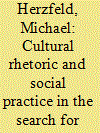

|
|
|
|
|
| Summary/Abstract |
A Bangkok community that has successfully warded off the threat of collective eviction for over 20 years, Pom Mahakan – located in the symbolically dense historic old dynastic city, next to the wall associated with the latter's foundation – has aimed at a plan of accommodation between housing rights and historic conservation that deserves serious consideration as a model for emulation. Yet the community still struggles to stay on-site; its currently dubious legal status, resulting from an ill-advised acceptance of an eminent domain order on which the community subsequently reneged on the grounds of inadequate compensation, may typify other such cases, and this suggests an urgent need for legal reform so that the authorities can ratify the community's plan and enable other communities to follow its lead. This article thus explores the wider implications of the Pom Mahakan case for social justice as well as heritage conservation in and beyond the Thai polity, taking particular account of the tension between egalitarian and authoritarian impulses that continues to characterize this nation-state and especially its political and bureaucratic life.
|
|
|
|
|
|
|
|
|
|
|
|
|
|
|
|
| 4 |
ID:
135004


|
|
|
|
|
| Summary/Abstract |
This article adds to the literature explaining a rise in the levels of violence and intimidation against the Islamic sect Ahmadiyah in Indonesia. In contrast to approaches that stop at describing the actors or doctrinal differences involved, this article situates the anti-Ahmadiyah discourse in wider processes of maintaining or securing political and social authority. The author first describes how charges of heresy have historically served to consolidate state and political authorities. This analysis is then extended into the post-Soeharto landscape by showing how the charges of heresy against Ahmadiyah have supported fragments of the New Order state to claw back some of the authority lost after the 1998 political transition. Finally, the author situates this process in the context of increased competition among religious authorities. The implications of using such an approach are twofold: first, the Indonesian state's role in the conflict is not defined only by its absence but also by its active involvement; and second, understanding the rise of conservative ulama as part of a wider process of an increase in many different voices weakens the claim that Indonesia is becoming more religiously conservative. The more general conclusion is that the role of academic writing should be to contextualize contemporary discourses of heresy by revisiting some of the methods used in classic heresiology.
|
|
|
|
|
|
|
|
|
|
|
|
|
|
|
|
| 5 |
ID:
135011


|
|
|
| 6 |
ID:
135013
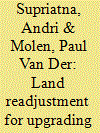

|
|
|
|
|
| Summary/Abstract |
A majority of Jakarta's population resides in unregulated and densely populated settlements called kampung, with no access to utilities. The urban development policy of previous municipal governments focused strongly on modernization of the city to the neglect of the poor kampung population. The Kampung Improvement Programme, started in 1969, is considered a notable exception to this tendency. However, despite efforts to improve the conditions in kampung, the number of kampung dwellers is increasing. The governor of Jakarta aims to revitalize 350 kampung in his first term of office (by 2017). This paper investigates whether the land readjustment procedure that is applied in many countries may contribute to the realization of this ambition. The findings indicate that such is indeed the case and a pilot project is recommended.
|
|
|
|
|
|
|
|
|
|
|
|
|
|
|
|
| 7 |
ID:
135005
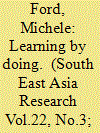

|
|
|
|
|
| Summary/Abstract |
Academic studies of local politics in post-Suharto Indonesia focus on the emergence of coalitions between parties and candidates, arguing that the entrenched and dominant role of political elites has effectively excluded non-elite interests from the electoral arena. The question, then, given the very real and serious obstacles to popular participation, is: what possibility is there for non-elite actors to engage in a meaningful way in electoral politics? One example of an attempt at such engagement can be found in the industrial city of Batam, where the local branch of the Federation of Indonesian Metalworkers Unions set up a purpose-specific structure to promote the political interests of its members in successive local executive and legislative elections. This paper argues that, despite the ultimate failure of the union's electoral experiments between 2004 and 2009, the process of 'learning by doing' embedded in them presents a significant challenge to analyses that discount the possibility of substantive popular participation in electoral politics.
|
|
|
|
|
|
|
|
|
|
|
|
|
|
|
|
| 8 |
ID:
135014


|
|
|
|
|
| Summary/Abstract |
This paper investigates the effects of market power on credit risk, revenue diversification and bank stability in selected Association of Southeast Asian Nations (ASEAN) member countries (Indonesia, Malaysia, the Philippines, Thailand and Vietnam) using a sample of 153 commercial banks during 1998–2010. The authors find that bank market power is positively associated with credit risk and revenue diversification. Nevertheless, these associations diminished during the global financial crisis (GFC), implying that banks with greater market power have been better able to manage their non-performing loans during the crisis period. Bank stability, however, is not associated with market power. Instead, it is found to be a negative function of state ownership, asset composition and banking freedom. Overall, even though ASEAN banks with greater market power have higher credit risk, they are more diversified, thus leaving their overall bank risk unaffected.
|
|
|
|
|
|
|
|
|
|
|
|
|
|
|
|
| 9 |
ID:
135002
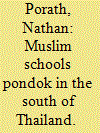

|
|
|
|
|
| Summary/Abstract |
This paper focuses on the ponoh/pondok Muslim schools of the south of Thailand. These schools, which are traditional institutions of religious learning and places of religious piety, have experienced conflict and contestations throughout the twentieth century. Pondok have been pulled by different modernizing forces including separatist violence. The paper concludes that the contestations and negotiations with the Thai government are about the development of the local Malay people's modern civic identity within Thailand. It suggests that the introduction of a secular curriculum has had (and still has) its benefits for empowering the Malay-speaking population by supplying them with the cultural tools to contest and civically negotiate their position, culture and heritage within the Kingdom. The paper also provides a history of these schools and their political relationship to the Thai government's policies and to separatist organizations, as well as an update of events relating to the schools during the recent period of separatist and counter-separatist activities.
|
|
|
|
|
|
|
|
|
|
|
|
|
|
|
|
|
|
|
|
|